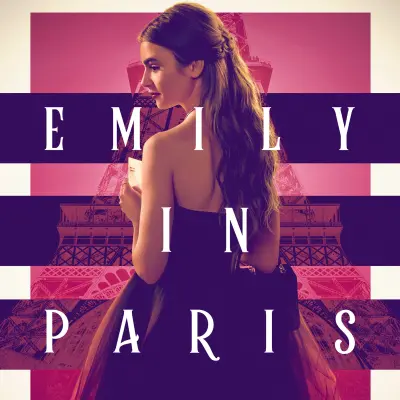Emily in Paris is more like a "self-hate watch" than "hate-watch"
-

Darren Star's buzzworthy Netflix dramedy "belongs to a storied category of show, the hate watch—which, to be pedantic, I have always thought was the wrong name," says Willa Paskin. "It’s more like a self-hate watch (though that isn’t quite right either), because it isn’t just that you are evaluating the show’s quality—that happens with every show—but that the show is putting you into an alienated relationship with yourself and your own taste. Why am I still watching The Newsroom, even though I can tell it is hugely flawed? What is Smash doing for me, and to me, that I enjoy it, even though I see that it is broken? Why have I burned through all of Emily in Paris in two days? A hate watch can’t be all bad, or we wouldn’t watch at all, but it can’t be all good, or we’d spend less time thinking about it. I love a category of thing that makes taste wobble before us like a possessed seesaw (anything to remind us that what we prefer is personal and imperfect). But does that mean I have to love Emily in Paris? This frothy, capitalist fantasia belongs to a category of show about which judgment comes easily. It’s TV chick lit, a rom-com in a foreign location where nothing bad ever happens and the cute protagonist gets laid a lot on her way to having it all. But the complicating thing about Emily in Paris—the best thing about it really, the thing that turns it from a trifle people enjoy into a curiosity they enjoy insulting—is how brittle its protagonist is. This quality is confusing, because the show visually resembles creator Darren Star’s Younger, which starred the delightful Sutton Foster, and apes the premise of his Sex and the City, another show about an indomitable and very charming woman in (significantly less good but still try-hard) clothes, making her way in a fashionable metropolis that has been sanitized into a back lot. Emily (Lily Collins) cannot figure out how to take the Métro any more than Carrie Bradshaw took the subway, but the similarities end there. For all the random Parisians that take to her, Emily, particularly in a work context, gives a horrible first impression. She is not a charmer, a flirt, or an observer. She is a bulldozer. When she meets a hotelier, also from her native Chicago, at a party, she jumps right into a pitch, trying to win his business for the marketing firm at which she is a social media expert. The hotelier finds it off-putting, and so do we: Where is the light conversation, the flirtation, the Carrie Bradshaw? There is only Emily, perkily focused on her uninspired work, who uses her beauty to grease being a grind."
ALSO:
- Emily in Paris may be perfectly calibrated for binge-watching in 2020: "Emily in Paris is at present one of Netflix’s most popular new shows, the subject of innumerable articles and listicles and a plethora of commentary on Twitter," says Philippa Snow. "The consensus would appear to be that although it is bad, it is bad in the perfect mode for circa-2020 bingeing: lightweight and unchallenging enough to avoid being offensive, and absurd enough to allow viewers to poke holes in its logic."
- Lily Collins leaves Emily in Paris fans confused by saying her character is about 22 years old: As one Twitter user put it: "Um @lilycollins, I'm not sure how to tell you this but a 22 year old with a master's degree AND relevant work experience is either a genius who graduated college at 18 or is lying about her age.."
- Lucas Bravo also says Emily is around 22
- Why is Darren Star so obsessed with entitled white women acting grossed out by other cultures?
- What happens when you trying growing your Instagram with Emily in Paris' tactics?
- Ashley Park calls Darren Star "The Sondheim of TV writing"
- Meet the real Emily in Paris: 28-year-old American Emily Jackson is a "go-getter" who lives in Paris
TOPICS: Emily in Paris, Netflix, Darren Star, Lily Collins, Lucas Bravo
More Emily in Paris on Primetimer:- Is there going to be Emily in Paris season 6? Renewal status and more
- Emily in Paris season 5: Release date and time, where to watch, and what to expect
- What happened to Diego Borella? Emily in Paris assistant director’s on-set cause of death explored
- Who was Diego Borella? All you need to know as Emily in Paris assistant director dies at 47 after collapsing on set
